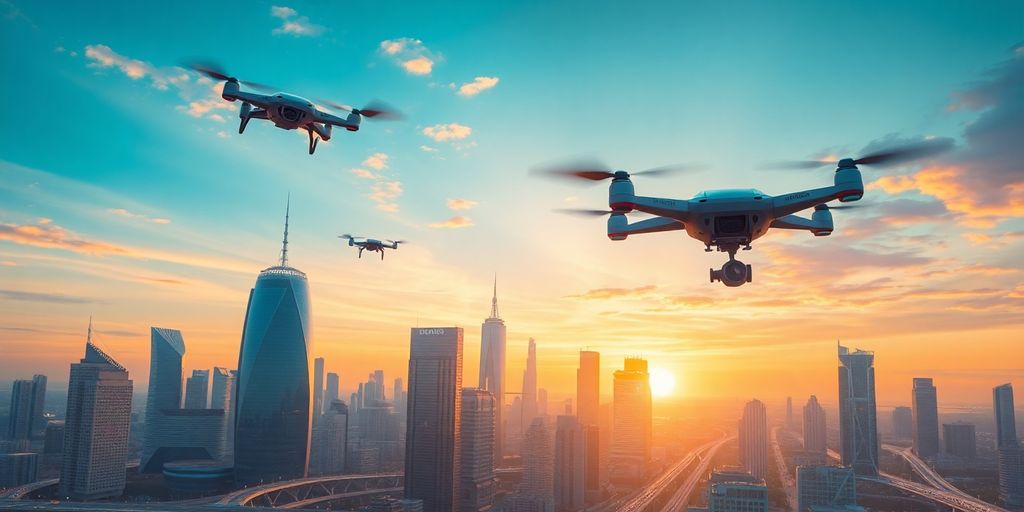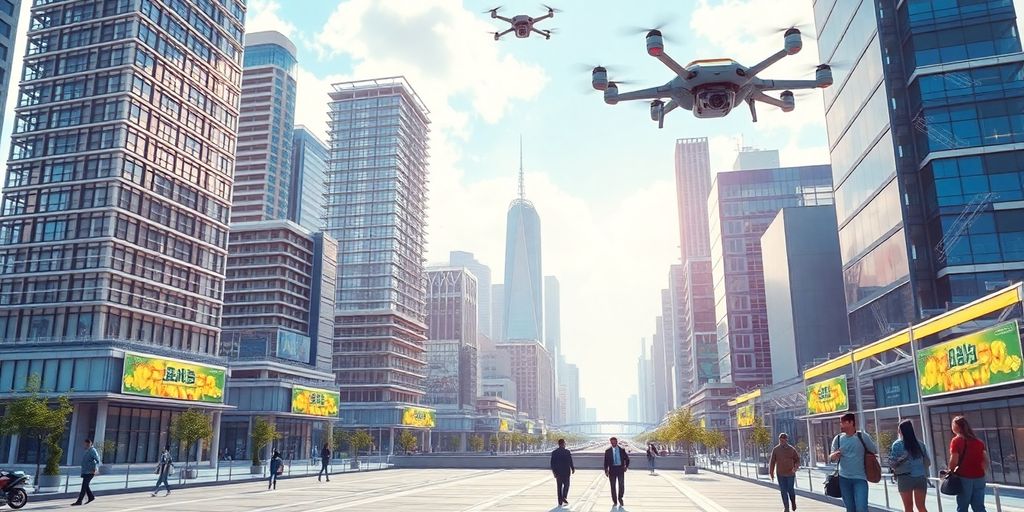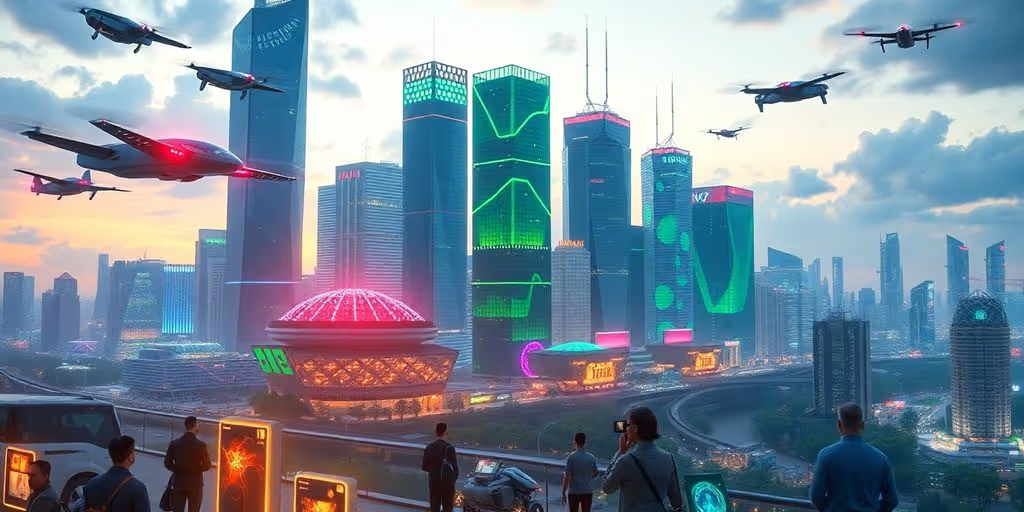Exploring the Future of Technology: Innovations Shaping Our World in 2025
Discover the technology innovations shaping our world in 2025, from AI to sustainability and beyond.
As we look ahead to 2025, the landscape of technology is evolving at breakneck speed. Innovations are not just changing how we interact with the world; they are reshaping industries and our daily lives. From artificial intelligence to sustainable practices, the next few years promise to be a transformative period in technology. This article explores the key trends and innovations that will define our future, offering insights into how we can adapt and thrive in this new tech-driven era.
Key Takeaways
- Generative AI will revolutionize creative processes across various industries.
- Quantum computing is set to tackle complex problems that traditional computers can't handle.
- 5G technology will enhance connectivity, enabling new applications in IoT and smart cities.
- Sustainability will be a priority, with technology playing a key role in promoting green initiatives.
- The future workplace will blend remote and in-office environments, focusing on employee well-being and collaboration.
Transformative Innovations in Technology

Generative AI and Its Impact
Generative AI is really changing things. It's not just about making cool images anymore; it's becoming a tool that businesses are using to create content, design products, and even come up with new ideas. The ability of AI to generate realistic and original content is revolutionizing industries, but there are also questions about how they should be deployed responsibly. It's a wild time to be alive, watching AI evolve so quickly.
The Rise of Quantum Computing
Quantum computing is still kind of a far-off concept for most people, but it's getting closer to becoming a reality. We're talking about computers that can solve problems that are impossible for regular computers. This could mean huge breakthroughs in medicine, materials science, and even finance. Quantum-powered AI is unlocking possibilities we couldn't even dream of before. It's like we're on the verge of a new era of computation.
Advancements in 5G Technology
5G is more than just faster internet on your phone. It's the backbone for a lot of other technologies, like self-driving cars and smart cities. With 5G, we can have super-fast, reliable connections that allow devices to communicate with each other in real-time. This opens up a whole new world of possibilities for smart cities, industrial automation, and healthcare. It's like building a superhighway for data, and it's going to change everything.
5G is not just about speed; it's about creating a network that can support a massive number of devices and applications. This will enable new business models and transform the way we live and work.
The Role of AI in Shaping Future Industries

AI is changing pretty much everything, and it's not slowing down. Industries are being reshaped in ways we couldn't have imagined just a few years ago. It's not just about automation anymore; it's about creating entirely new possibilities. Let's take a look at some key areas where AI is making a huge impact.
Agentic AI and Automation
Agentic AI is really taking off. These are AI systems that can handle complex tasks without needing constant human oversight. Think of it like giving AI a goal and letting it figure out the best way to achieve it. This is transforming industries like logistics, finance, and healthcare. By automating workflows and adapting to real-time data, these agents are boosting efficiency and freeing up human teams for higher-value work.
Agentic AI will automate high-value tasks, allowing teams to focus on strategy and creative problem-solving.
Ethical AI Governance
As AI becomes more powerful, the need for ethical guidelines and governance becomes critical. It's not enough to just build AI; we need to make sure it's used responsibly and fairly. This means addressing issues like bias in algorithms, data privacy, and transparency in decision-making. Companies are starting to realize that ethical AI is not just a nice-to-have; it's a must-have for building trust and avoiding potential legal and reputational risks. Ethical AI governance is about creating frameworks and policies that ensure AI systems are aligned with human values and societal goals.
Here are some key aspects of ethical AI governance:
- Transparency: Making AI decision-making processes understandable.
- Fairness: Avoiding bias in algorithms and data.
- Accountability: Establishing responsibility for AI outcomes.
AI in Healthcare and Finance
AI is revolutionizing both healthcare and finance. In healthcare, AI is being used for everything from diagnosing diseases to developing new treatments. It can analyze medical images, predict patient outcomes, and personalize treatment plans. In finance, AI is being used to detect fraud, manage risk, and provide personalized financial advice. It can analyze market trends, automate trading, and improve customer service. The potential benefits are huge, but it's important to address the ethical and regulatory challenges to ensure these technologies are used safely and effectively.
| Industry | AI Application | Example |
Sustainability and Technology Integration
It's not just about cool gadgets anymore; it's about making sure our tech doesn't trash the planet. We're seeing a big push to weave sustainability right into the core of technological innovation. This means thinking about the whole lifecycle of a product, from where the materials come from to what happens when we're done with it. It's a complex challenge, but one that's becoming increasingly important.
Green AI Initiatives
AI is powerful, but it also sucks up a ton of energy. Training those massive models? Forget about it. That's why Green AI is becoming a thing. It's all about finding ways to make AI more efficient and less of an energy hog. Think about optimizing algorithms, using more efficient hardware, and even rethinking how we train these models. It's not just about being eco-friendly; it's also about making AI more accessible and affordable.
Circular Economy Models
The old way of doing things – make, use, dispose – is just not going to cut it anymore. We need to shift to a circular economy, where products are designed to be reused, repaired, or recycled. This means thinking about materials differently, designing for disassembly, and creating systems for sustainable technology recovery. It's a big change, but it's essential for reducing waste and conserving resources.
Here's a quick look at how circular economy principles can impact different sectors:
Responsible Innovation Frameworks
We can't just blindly chase after the next big thing without thinking about the consequences. That's where responsible innovation comes in. It's about developing frameworks and guidelines to ensure that technology is developed and used in a way that's ethical, sustainable, and beneficial to society. This includes things like data privacy, algorithmic transparency, and carbon capture methods. It's about thinking critically about the potential impacts of technology and taking steps to mitigate any risks.
It's not enough to just create cool technology. We need to make sure that it's used for good and that it doesn't come at the expense of the environment or society. This requires a shift in mindset and a commitment to responsible innovation at all levels.
Emerging Technologies Driving Change
Blockchain Applications
Blockchain is moving beyond just cryptocurrency. It's finding uses in supply chain management, healthcare, and even voting systems. Think about tracking products from the factory to your door, ensuring medicine authenticity, or making elections more secure. The decentralized nature of blockchain makes it ideal for applications where trust and transparency are paramount. It's not a magic bullet, but it offers a compelling alternative to traditional databases in many scenarios.
Edge Computing Developments
Edge computing is about bringing computation and data storage closer to the devices that need it. Instead of sending everything to the cloud, data is processed locally, reducing latency and improving response times. This is huge for things like autonomous vehicles, IoT devices, and augmented reality. Imagine a self-driving car needing to react instantly to a pedestrian – edge computing makes that possible. It's also beneficial in areas with limited internet connectivity. technology modernization trends are making this possible.
Autonomous Systems in Transportation
Autonomous systems are poised to revolutionize transportation. We're not just talking about self-driving cars; think drones delivering packages, autonomous trucks hauling freight, and even self-piloting ships. The potential benefits are enormous: increased efficiency, reduced accidents, and lower costs. However, there are also challenges to overcome, such as safety regulations, ethical considerations, and job displacement. It's a complex issue with no easy answers. Here are some of the benefits:
- Increased efficiency in logistics and delivery.
- Reduced human error and potential for accidents.
- Lower operational costs for transportation companies.
The integration of these systems requires careful planning and consideration of societal impacts. It's not just about the technology; it's about how we adapt to a world where machines are increasingly making decisions for us.
The Future of Work in a Tech-Driven World
Hybrid Work Models
Okay, so hybrid work is the thing now, right? It's not just about working from home sometimes. It's about companies actually rethinking how work gets done. It's a mix of in-office and remote, but the key is making it work well. Think flexible schedules, shared workspaces, and tech that connects everyone, no matter where they are. It's a big change, and companies are still figuring it out. For example, a tech company might offer employees flexible office days or remote setups.
Employee Well-Being and Technology
Let's be real, tech can be a blessing and a curse. It helps us get stuff done, but it can also lead to burnout. Companies are starting to realize that employee well-being is super important. It's not just about offering yoga classes (though those are nice!). It's about using tech to support mental health, reduce stress, and create a better work-life balance. This means things like mindfulness apps, virtual therapy, and tools that help people disconnect after work hours.
Here's a quick look at how tech can help:
- Mental health apps for stress reduction
- AI-powered tools for task management
- Platforms for virtual social connection
It's not just about productivity anymore; it's about creating a work environment where people feel supported and valued. This includes providing resources for mental health, encouraging breaks, and promoting a culture of open communication.
Collaboration Tools for Remote Teams
Remote work only works if people can actually collaborate effectively. That's where collaboration tools come in. We're talking about video conferencing, project management software, and shared document platforms. But it's not just about having the tools; it's about using them well. Companies need to train employees on how to use these tools effectively and create clear communication protocols. Think Microsoft Teams, Slack, Zoom AI, all that jazz. The goal is to make remote collaboration feel as seamless as possible. It's about greater automation and efficiency, right?
Consumer Experience Revolutionized by Technology
It's wild how much tech is changing what we expect as customers. It's not just about getting things done faster; it's about feeling understood and valued. Companies are using data and AI to make every interaction feel personal, and honestly, it's raising the bar for everyone.
Predictive Analytics in Customer Service
Imagine a world where companies know what you need before you even ask. That's the promise of predictive analytics. By crunching tons of data, businesses can anticipate problems, offer solutions, and generally make your life easier. It's like having a mind-reading customer service rep, but, you know, without the creepy mind-reading part. This proactive approach is becoming the new standard.
- Anticipate customer needs before they arise.
- Offer personalized solutions based on past behavior.
- Reduce customer churn by addressing issues proactively.
Predictive analytics is not just about solving problems; it's about creating opportunities to delight customers and build lasting relationships. It's about turning data into empathy and using technology to make people feel truly seen and heard.
Omnichannel Customer Journeys
Think about how you interact with a company. Maybe you start by browsing their website, then you call customer service, and finally, you visit a store. An omnichannel approach aims to make all those touchpoints feel like one seamless experience. No more repeating yourself or starting from scratch every time you switch channels. It's all connected, all the time. This is enabled by AI integration.
- Consistent branding across all channels.
- Unified customer data for personalized interactions.
- Easy transitions between online and offline experiences.
Personalization Through Data Insights
Personalization is the name of the game. Companies are collecting data on everything from your purchase history to your browsing habits to your social media activity. All this data is used to create a personalized experience. It's about showing you the products you're most likely to buy, offering you deals you can't refuse, and generally making you feel like you're the only customer that matters.
Here's a quick look at how data is used for personalization:
Leadership Strategies for a Technological Era
It's 2025, and leading a team isn't what it used to be. Tech is everywhere, changing how we work, how we connect, and even what we expect from our leaders. It's not enough to just understand the tech; you've got to understand how it affects your people and how to guide them through it all.
Visionary Leadership in Tech
Having a clear vision is always important, but in the tech world, it's absolutely critical. You need to be able to see where the technology is going and how it can help your organization. It's about more than just adopting the latest gadgets; it's about understanding the potential and communicating that to your team. It's about setting a course and inspiring everyone to follow, even when the path isn't clear.
Empathy in Management
Tech can be impersonal, and that's where empathy comes in. It's easy to get caught up in the data and the algorithms, but you can't forget that there are real people behind all of it.
- Understanding their concerns
- Addressing their fears
- Supporting their growth
Empathy isn't just a nice-to-have; it's a must-have. It's about creating a work environment where people feel valued and supported, even when things are changing rapidly.
Adapting to Rapid Technological Changes
Things are moving fast, and if you're not willing to adapt, you're going to get left behind. It's not just about learning new skills; it's about having a mindset that embraces change.
Here's what I've found helpful:
- Encourage experimentation. Let your team try new things, even if they fail. That's how you learn.
- Stay curious. Read, attend conferences, and talk to people in other industries. You never know where you'll find the next big idea.
- Be open to feedback. Listen to your team and be willing to change your mind. They're often closer to the ground than you are.
Final Thoughts: Shaping Tomorrow Together
As we look ahead to 2025, it’s clear that technology is set to change everything. From how we work to how we connect, the innovations on the horizon will redefine our daily lives. Those who embrace these changes will not only adapt but thrive in this new landscape. It’s not just about keeping up; it’s about being proactive and seizing opportunities. The future is being crafted right now, and it’s up to each of us to decide how we’ll fit into this evolving picture. So, what’s your plan? How will you make the most of these advancements?
Frequently Asked Questions
What is Generative AI and why is it important?
Generative AI is a type of artificial intelligence that can create content, like text, images, or music. It's important because it can help businesses save time and create new ideas.
How will quantum computing change technology?
Quantum computing uses the principles of quantum mechanics to solve problems much faster than regular computers. This could lead to breakthroughs in fields like medicine and finance.
What are the benefits of 5G technology?
5G technology offers faster internet speeds and more reliable connections. This means better streaming, quicker downloads, and improved communication for everyone.
What is the role of AI in healthcare?
AI can help doctors by analyzing patient data quickly and accurately. It can also assist in diagnosing diseases and suggesting treatments, leading to better patient care.
How can technology help with sustainability?
Technology can promote sustainability by reducing waste and energy use. For example, smart devices can help monitor and manage energy consumption in homes and businesses.
What skills will be important for jobs in 2025?
In 2025, skills like coding, data analysis, and understanding AI will be very important. Also, being able to work with new technologies and adapt to changes will be key for success.








